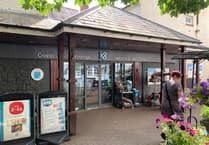LONDONER, Richard Jordan’s love affair with Monmouthshire goes back sixty years to the time his group played at the 1958 New Year’s Eve Dance in Llanellen Village Hall.
The young musicians had to rely on the generosity of local people, putting them up to avoid the long drive back to the big city in those pre-M4 days.
Now, after a lifetime that had been filled with not one but several successful careers, Richard has come back for good, settling in Grosmont among the scenery that provides much of his inspiration.
Richard epitomises Shakespeare’s claim that, ‘One man in his time plays many parts.’ Now a successful and sought-after photographer, he has also been an actor, film cameraman, professional musician and proprietor of one of the most iconic music clubs of the Swinging Sixties.
It was in 1960 that Richard became a club owner, opening the iconic venue, Klooks Kleek in Hampstead where some of the greatest names in world music clamoured to play.
Throughout its nine year history, the club hosted the likes of Cream, Fleetwood Mac, Led Zeppelin, Jimi Hendrix, Eric Clapton, Elton John, Long John Baldrey, Georgie Fame, Rod Stewart and Stevie Wonder.
Aspiring musicians, eager to be seen by the movers and shakers of the music industry, would play the venue - based at the Railway Hotel and strategically situated next door to Decca Records.
‘We brought some great acts to the stage and watched them grow. Jimi Hendrix went from earning £100 a spot to £1,000 a spot almost overnight. Decca Records would run cables from their studio to our stage to record live albums such was the sound quality at our venue,’ said Richard.
Klooks Kleek became the must-visit destination in town at a time when London was the centre of the pop music world. But it was not just pop; godfathers of blues such as Alexis Korner and John Mayall called it home along with jazz giants Ronnie Scott and Sonny Rollins.
But Richard’s involvement with show business stretches back into childhood. Born in St John’s Wood, London, he was a child actor appearing in many theatre productions as well as Ralph Reader’s Gang Show at the Royal Albert Hall.
In the late 1950s he took up the trombone, taking lessons from Eddie Harvey, trombonist with the Johnny Dankworth Orchestra, before joining the Harrod’s Dance Band - a fashionable semi-pro group playing high society functions and grand balls - including a private party for Princess Margaret.
There followed a stint as a cameraman, notably with big screen advertisers, Pearl and Dean but music remained Richard’s first love. By the end of the ‘Sixties, disco was making serious inroads into the heartland of musical nightlife and Klooks Kleek closed its doors for the last time in 1970.
Richard then became an agent, making good use of his countless contacts throughout the industry he helped launch and maintain the careers of the likes of Queen, Elkie Brooks, The Police, Jools Holland and Fleetwood Mac.
He stated, ‘There comes a time, however, when you realise the music business is driving you close to total insanity and so I opted for a complete change.’
Richard swapped the noise and frenetic pace of London for the peace and birdsong of Monmouthshire, working for a while in advertising and as an antiques dealer but it was a love of photography that turned a hobby into his latest career.
Richard has toured the world taking pictures, including a memorable trip along the length of Route 66, through the heartland of the USA from Chicago to Los Angeles. But it is close to home where his lens has captured some of his most stunning and commercial images.
Featuring scenes from throughout North Monmouthshire and the borders, many of his pictures will be on show and for sale at a special exhibition in All Saints Cafe, Broad Street, Hereford from Monday June 4th to Saturday July 7th.
In his spare time, Richard now gives talks to local clubs and societies with subjects including ‘Growing up in London during World War Two’, ‘The Life of Frank Sinatra’ and ‘The life and death of Glenn Miller’ - who once met his mother in the American Officers Club in London.
It has been said that the music business never lets you go until you have no songs left to sing, but given Richard’s varied career and interests it appears there might be an album or two still to come.





This article has no comments yet. Be the first to leave a comment.